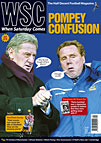 Steve Menary reports on the increasing shortage of City investors in football's surviving plcs
Steve Menary reports on the increasing shortage of City investors in football's surviving plcs
Sheffield United’s board must be pretty sure of promotion to the Premiership having turned to the Stock Exchange to raise £10.7 million early last month. A large slice of the cash is earmarked for players’ wages, but the club will plough £2.7m into a redevelopment of the corner stand at Bramall Lane due for completion in May and £1m towards buying a £4m health club in Staines. Chief executive officer Jason Rockett said: “We’re trying to create a new model for a club and produce off-field revenue with the club at the centre. It’s got to be a more sustainable business.”
The Blades already own the Impact Gym in Sheffield and are considering building a hotel and casino, which would probably be viewed as better investments by interested investors than players’ wages – certainly if Watford overhaul the Blades for the second guaranteed promotion spot. This would appear to be quite a big gamble for any City institutions interested in investing, but not much of the £10.7m that will be raised in return for new shares is likely to come from the Square Mile.
Scarborough Property, a company controlled by Blades chairman Kevin McCabe, is putting up £8.4m in return for more shares, with the club hoping that City punters will make up the difference. As McCabe already controls 46.8 per cent of Sheffield United plc and could own up to 62 per cent after the fundraising, under City rules he should have to buy the remaining shares he does not own. Instead, he is being allowed to bypass this rule by the Takeover Panel, with the deal expected to be waved through by the plc on March 3.
The Takeover Panel is making this exception because institutions don’t want to invest in football clubs any more – certainly not into a club intending to plough such a huge chunk of the funds being raised into players’ pockets.
Professor Christine Oughton at Birkbeck College’s football governance research centre says: “Clubs expected a big rise in revenue from TV, but investors didn’t realise the clubs are under pressure to spend it all. Football’s prune-juice economics meant it all went straight out again on players’ wages.” How many fund managers will want to add to McCabe’s largesse?
Since Manchester United floated in 1991, there have been 27 English and Scottish clubs listed on the Stock Exchange, along with Swansea from Wales. After an initial boom, disastrous financial performances at clubs falling out of the Premiership, such as Leeds, Leicester and Nottingham Forest, sent share prices into freefall and clubs started to quit the stock market. QPR delisted in 2001 and a wave of clubs followed: Aberdeen and Bolton Wanderers in 2003 and Sunderland in 2004, Celtic last December and West Bromwich Albion and Hearts in January.
When Manchester United succumbed to the Glazers, the only blue-chip football club were gone. Unlike most plc clubs, United were profitable and provided dividends for shareholders. Football funds such as Singer & Friedlander’s scheme, which boasted Alan Hansen, have produced woeful returns.
For the dozen clubs left languishing on the stock market, the problem is how to get off it. Birmingham City were looking to escape five years ago, while only Roman Abramovich’s deep pockets could afford to buy debt-laden Chelsea. Like the Blades, Chelsea had downgraded from the main Stock Exchange to the Alternative Investment Market (AIM) as this junior market has fewer regulations and staying quoted is cheaper.
Arsenal, Manchester City and Rangers are quoted on Ofex, an even more loosely regulated market known as the third division of the Stock Exchange. Looser regulation allows big investors such as Rangers’ David Murray to hold a controlling interest in the club without being forced to buy the rest of the shares. On the main London Stock Exchange, any shareholder – such as the Glazers – must offer to buy all the shares once they acquire a 30 per cent stake, or seek a waiver as McCabe did.
For fans, the shares are about more than a return, but investors who swooped for a quick profit and face a big loss on their investment have scored a sorry own goal and will find little sympathy among supporters.
From WSC 230 April 2006. What was happening this month